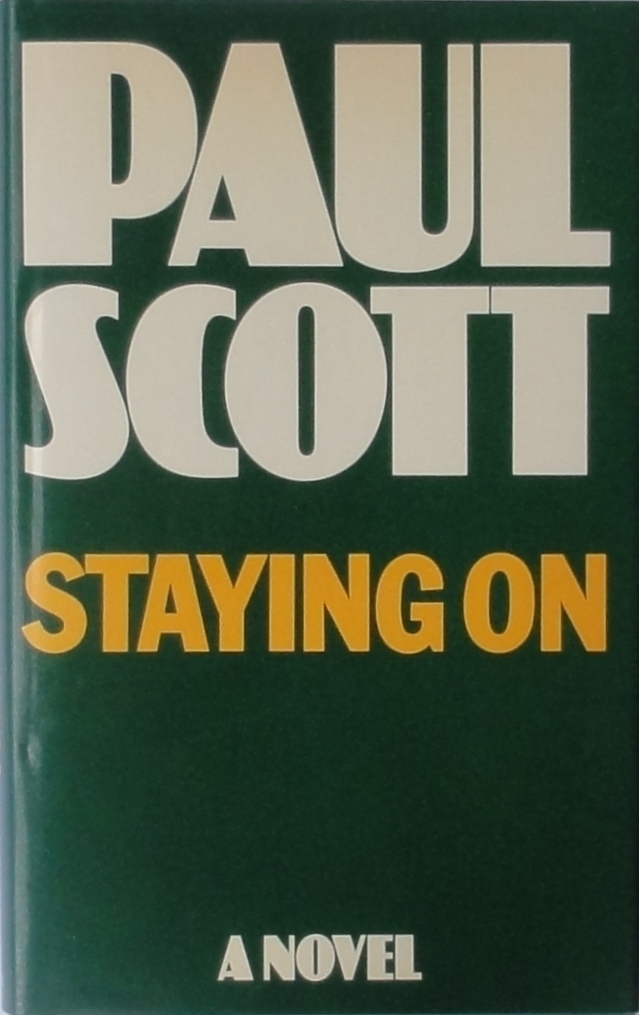Hardcover, 216 pages
English language
Published Feb. 3, 1977 by Heinemann.

Hardcover, 216 pages
English language
Published Feb. 3, 1977 by Heinemann.
In 1972, Colonel 'Tusker' Smalley (Indian Army, Retd.), and his wife Lucy ('Little Me'), are still living in Pankot, one of India's hill-stations.
Twenty-five years after the rest of the British left India they are still at Smith's Hotel, or rather in its diminutive annexe. Tusker for reasons that become clearer to the reader than they have ever been to Lucy elected to 'Stay On' in 1947.
After a brief period advising independent India's successor army and a longer career as a box-wallah in Bombay Tusker retired at last, and calculating the advantage that a British pensioner might have by opting for India's inflationary spiral in Pankot instead of Britain, 'stayed on' yet again.
Dutiful (but sexually disappointed) wife as she has always been, Lucy of course has stayed on too: so here they are, still enacting the roles of Colonel Sahib and Colonel Memsahib — but in a play …
In 1972, Colonel 'Tusker' Smalley (Indian Army, Retd.), and his wife Lucy ('Little Me'), are still living in Pankot, one of India's hill-stations.
Twenty-five years after the rest of the British left India they are still at Smith's Hotel, or rather in its diminutive annexe. Tusker for reasons that become clearer to the reader than they have ever been to Lucy elected to 'Stay On' in 1947.
After a brief period advising independent India's successor army and a longer career as a box-wallah in Bombay Tusker retired at last, and calculating the advantage that a British pensioner might have by opting for India's inflationary spiral in Pankot instead of Britain, 'stayed on' yet again.
Dutiful (but sexually disappointed) wife as she has always been, Lucy of course has stayed on too: so here they are, still enacting the roles of Colonel Sahib and Colonel Memsahib — but in a play whose plot has been subtly altered by translation (as it were) from English into Hindi (or Punjabi).
For example: the old walk-on part of Faithful Servant has become an 'also starring' part for the one servant the Smalleys can afford: Ibrahim, western movie-fan, comptroller of the modest household, student of the poetry of the English vernacular and ex-illegal immigrant in Finsbury Park (London, N). The senior regimental officer and his wife, Colonel and Mrs Menektara, although speaking the old Raj language, give parties to observe Hindu festivals at which Tusker tends to disgrace himself.
Last, but not least in this revised version of the comedy of the White Man's (and Woman's) Burden, there's no visiting Viceroy to bow or curtsey to but instead 16 stone Mrs Bhoolabhoy, who has recently bought the hotel and married its manager and lives on the premises.
Mrs Bhoolabhoy (known to her diminishing and terrorized staff as Ownership) has what Lucy would call very Indian ideas about running an hotel, and even the easy-going Mr Bhoolabhoy (known as Management) is forced eventually to the conclusion that the roof is no longer safe over anyone's head. Mrs Bhoolabhoy is going for growth.
Whether Tusker, irritably convalescent from the first illness of his life, realises this, Lucy is not sure, because they have reached the stage of non-communication the moment they open their mouths to one another. Beset by this problem, by the case of the disappearing mali, and the appearance of a new clergyman at St John's called Father Sebastian, the blackest high Anglican Lucy (herself a clergyman's daughter) has ever seen; worried about her falling stock of blue rinse for her now white hair, and above all about what will become of her if left widowed and alone amid India's alien corn, Lucy suddenly finds inspiration, from news of a Visitor from Home, to remember things past and tackle Tusker about the future — with the result that she receives the only love letter of her life.
Readers of Paul Scott's much earlier novel The Bender will not be surprised by the highly comic note sustained throughout Staying On. At the same time it is in the end a very moving book and also brings with it the same sense of India, all the brightness and pungency, that distinguished the author's justly celebrated sequence of novels, The Jewel and the Crown, The Day of the Scorpion, The Towers of Silence and A Division of the Spoils, now known collectively as The Raj Quartet (and available in one volume), in which Lucy and Tusker first appeared in the crowd scenes — so briefly that if you blinked you would have missed them. Here they are both splendidly on stage, centre, as Lucy always wished.